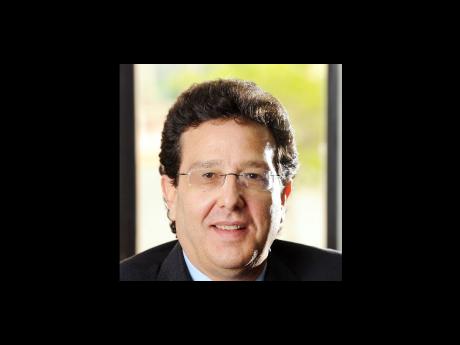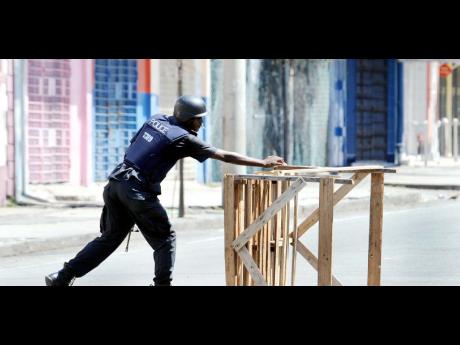'We must walk the talk' - no more state contracts to 'dons'
The following is an excerpt from a speech delivered by Joseph M. Matalon, president of the Private Sector Organisation of Jamaica (PSOJ), at its annual general meeting on May 26.
In January this year, after several months of intense preparation by our Economic Policy Committee under the able leadership of Nicholas Scott, the PSOJ published its Economic Policy Framework. The framework outlines what we believe are the key policy imperatives that must be implemented if the Jamaican economy is to move from its current level of stagnation to growth rates that are comparable with our neighbours in the region and with those of our trading partners. The framework posits that for Jamaica to achieve high rates of sustained economic growth and employment so that Jamaicans can experience significant improvements in their standard of living, the Government must:
Ensure macroeconomic stability
Reform the tax system
Create an enabling regulatory and legal environment
Reform industrial, trade and investment promotion policies.
We are happy to say that in the last few months our government has taken a series of actions that had been proposed in the framework aimed at addressing the ills that have characterised our economy for decades - the cycle of chronic fiscal deficits, high real interest rates, high debt and low growth. Among these policy actions was the Jamaica Debt Exchange, recognised both locally and internationally to have been one of the most successful such transactions ever undertaken anywhere in the world, and which provides an opportunity to break the cycle of an ever-expanding national debt.
I now wish to address an issue that I believe represents a matter of grave concern for you, our members, and indeed all law-abiding Jamaicans. I speak of the burgeoning crime problem and, at the heart of it, the incestuous links that exist between our political actors and the criminal underworld. The events of the past week indicate in no uncertain terms that crime and violence and their root causes are the greatest threats faced by our fragile economy and which are serving to undermine the positive economic trends I just outlined.
All well-thinking Jamaicans must now be grieving for our country and, on your behalf, I express sincere condolences to the law-abiding citizens who are beset with grief for the loss of innocent family members who have been victims of the effort to rid our communities of criminality, particularly over the last several days. We recognise and fully support the efforts of members of our security forces who have risked their lives to wage this battle, some of whom have paid the ultimate price with their lives.
all accountable
I want to suggest that all of us in this room have played a part in getting us to where we are today by:
✔ turning a blind eye to escalating criminal violence; accepting as a part of the status quo, the acknowledged links between our political actors and organised crime elements in the society
✔ electing successive governments without holding their 'feet to the fire' in implementation of the promises made in the heat of election campaigns
✔ accepting half-hearted and under-resourced attempts to reform our justice and national security systems.
Perhaps the most positive outcome of the anguish and mayhem of the last few weeks in the wake of the public outcry, has been the coming together of members of civil society, including the private sector, with a new resolve to 'take back' our country and play a greater role in the governance of the nation.
As you now know, two weeks ago, in the wake of the prime minister's revealing statement in Parliament, the private sector members in the Partnership for Transformation took the decision to suspend the agenda of our last meeting to allow us to consult with our constituents in order to formulate a common position on a way forward. Subsequently, the prime minister made his mea culpa and authorised the signing of the extradition order against Christopher Coke. Importantly, he also recommitted to addressing many of the burning issues for which your organisation has been advocating for some time, and for which commitments had already been made.
Over the last two weeks I have had a number of meetings and discussions with our members, with our council and the Council of Presidents, and we have agreed to put on the agenda of the next Partnership for Transformation meeting, a proposal for the creation of a specific timetable for these commitments, separating those that are achievable in the very short term and others that are achievable only in the medium or longer term.
commitments must be honoured
The PSOJ supports the view of our private sector colleagues that the realisation of the commitments made by the prime minister will require the cooperation of the Parliament, including the Opposition; but we also recognise that if we are to regain the trust and confidence in our leaders that have been so shattered over the last couple of weeks, these commitments must be honoured and we must be prepared to take those steps that are necessary to ensure that the commitments are indeed fulfilled in a timely manner.
Ladies and gentlemen, I, like many of you, feel that Jamaica is at a tipping point and now is the time, more than ever, for us to act to take back our country and help shape its future.
We must muster the courage to speak out and speak loudly but, more important, to act and help create a sea of change in our society. We must not only demand a higher standard of governance from our elected leaders, but we must look in the mirror and address the deficiencies in the way our own businesses are run.
Restoring law and order to this island must be our clarion call and we can only be credible in this effort if we ourselves become exemplary corporate citizens - obeying the laws of the land, and indeed paying our taxes. Let me again emphasise that no longer can we point fingers at others unless we ourselves are prepared to 'walk the talk'.
We must make it clear to our political directorate that they must commit to ceasing the award of state contracts to organisations with reputed criminal partners and associates. We must strongly support the contractor general's recommendation that legislation be enacted to ensure that businesses competing for government contracts subject themselves to significantly more stringent, fit and proper criteria; for it is well known that there are businesses with links to the criminal underworld that have morphed into so-called legitimate enterprise, able to satisfy the apparent indicators of legitimacy, including tax compliance certificates and the like. We must support the plugging of the obvious loopholes, such as subcontracting as a means of avoiding fit and proper scrutiny.
stop accepting donations
We must insist that our political parties stop accepting donations from tainted individuals and entities. As a demonstration of good faith and transparency, both political parties should commit, at the very least, to annually turning over their list of contributors to the political ombudsman to demonstrate that they are not, in fact, receiving contributions from known or reputed criminals and are, therefore, not beholden to these characters.
We must demand of both political parties that they rid themselves of those among their ranks, and particularly those seeking election as our Parliamentary and Local Government representatives who, by their past or current deeds, cannot be held up as persons of integrity.
We must quickly enact the anti-crime bills for which the PSOJ has advocated for over two years and which have been languishing in the Parliament while our murder rates have soared. These must include:
a. Strengthening wiretapping legislation to allow the intelligence collected in judicially authorised wiretappings to be more readily entered as probative evidence in court
b. Amending the Bail Act to broaden the considerations for denial of bail to persons who are accused of serious and heinous crimes
c. Passing omnibus post-arrest processing legislation to permit fingerprinting and photographing of all persons charged with violent offences and for the collection and storage of DNA of persons charged with violent offences and for repeat offenders
d. Implementing tougher, more effective RICO type anti-gang legislation as, given the threat to the very existence of the Jamaican State presented by the mushrooming growth of criminal gangs, the PSOJ believes that only the toughest measures will suffice.


